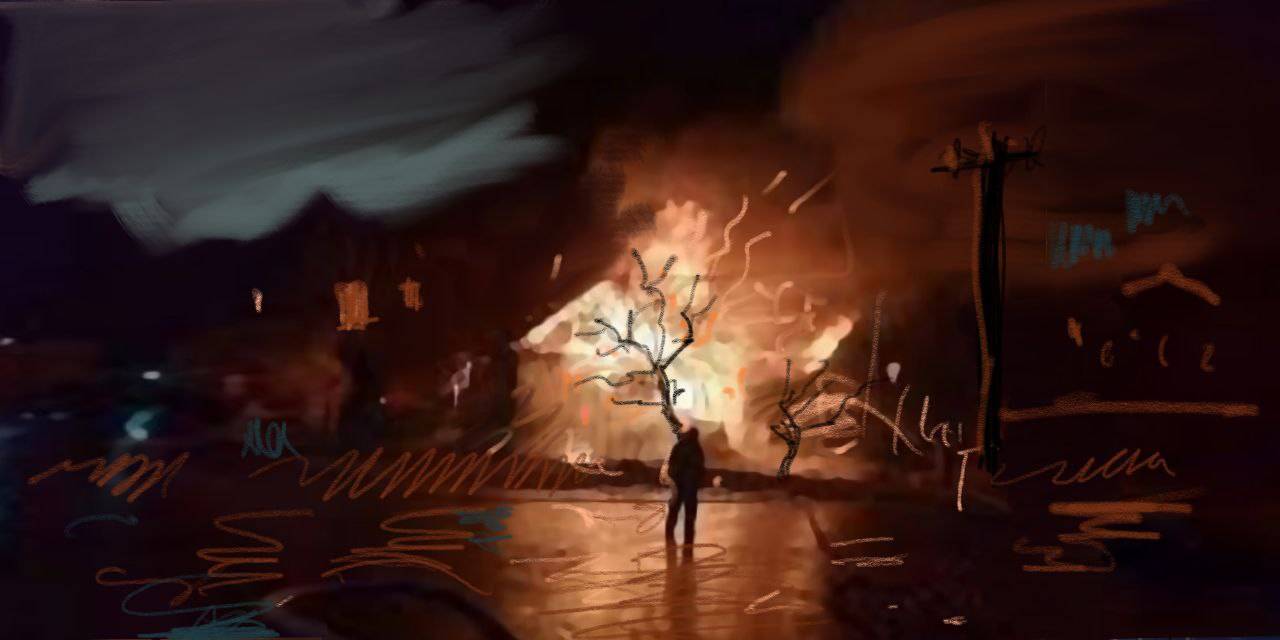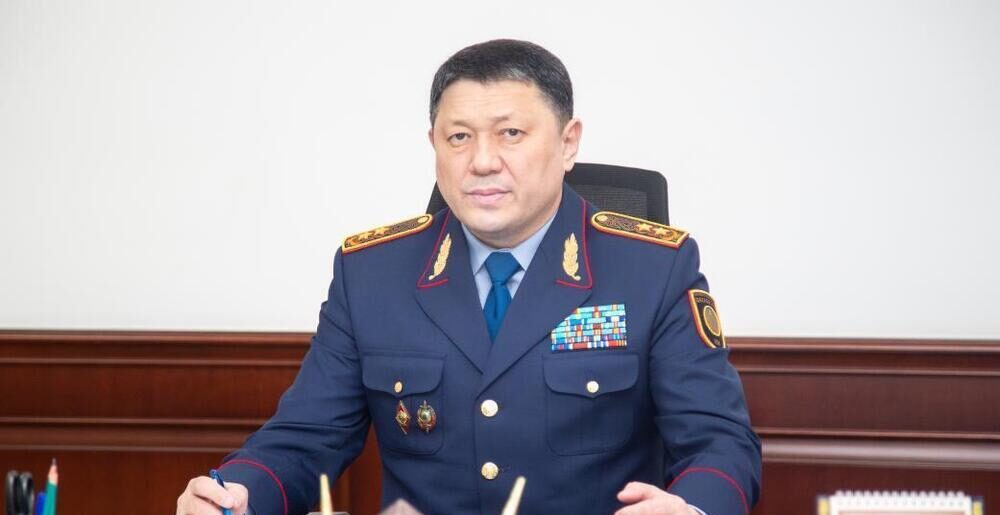On the night of October 4, 16-year-old Sherzat Bolat was killed in the town of Talgar, located in Almaty Oblast near the city of Almaty. The father of the victim blamed the incident on a gang – allegedly operating in Talgar and the surrounding area for many years – with connections to the government and law enforcement agencies. Later, unknown people burned down the family’s house, and National Guard troops were brought into Talgar. The situation brings to mind the darkest pages of recent history, when criminal groups held cities and entire neighborhoods in a state of fear.
The Talgar tragedy
Sherzat Bolat was murdered in front of his father and mother after an incident occurred involving young people who entered the store the Bolat family rented. As stated by the boy’s father, the customers refused to pay for a can of beer, and a fight broke out. According to other relatives, the group had knives and firearms. Sherzat’s uncle was also injured during the fight and is recovering in hospital.
Police initially claimed that all those involved in the incident had been detained, but the parents of the deceased later said that only seven had been arrested, while there were many more attackers. Fearing that the perpetrators would not be brought to justice, on October 7 Sherzat’s relatives and concerned citizens of Talgar staged a rally at which Sherzat’s father, Karzhaubai Nurymov, claimed that the so-called “Khutorskie” group was responsible for the boy’s death.
According to multiple reports, the Khutorskie have been terrorizing Talgar and its surroundings areas for many years. Businessman Hasan Kasymbayev allegedly runs the group, whilst sources also mention his brothers, including Yerzhan Kasymbayev, who was sentenced to 14 years for the murder of customs officer Medet Zhamashev, and Aslan Kasymbayev, head of the Talgar district Akim’s (mayoral) office. In addition, the Kasymbayevs are said to be related to an official who once held high positions in law enforcement agencies. According to concerned residents of Talgar, the perpetrators of the boy’s murder may be able to avoid justice due to their connections.
In a statement, the acting head of the regional police department denied the involvement of any organized crime groups in the murder; the investigation has now been taken over by the Ministry of the Internal Affairs, which has dispatched a team to the scene of the crime. In an interview, Hasan Kasymbayev, who posted controversial photos on social networks, categorically denied his involvement in the murder of the teenager and any participation in an organized crime group.
Despite assurances from officials, on October 12, the house of Sherzat’s family in the village of Azat, Yenbekshikazakh district, Almaty region, was burned down. Police opened a criminal case and took the murdered teenager’s family into protective custody. The house was empty at the time of the fire.
The murder and arson have caused a sharp reaction in Talgar and led to a wider reverberations throughout Kazakhstan. Former Minister of Education and Mazhilis deputy, Askhat Aimagambetov, stated on social networks that “the whole country is shocked by the tragedy that happened in Talgar… This cruel, cynical, and unjust crime has shaken each of us. It is a challenge not only to law enforcement agencies, but also to our entire society. Police and prosecutors must ensure that no one escapes accountability. This crime should be a turning point for systemic reforms in law enforcement. This is a legal requirement, and a duty to society.”
On October 13, residents of Talgar reported seeing military equipment and soldiers in the streets. The Ministry of Internal Affairs confirmed that National Guard units had been brought into the town to maintain order. The investigation continues, whilst near the Sherzat family’s store where the murder took place, residents of Talgar have erected a memorial.
A challenge to the authorities
Addressing the crimes, children’s rights ombudsman of the Almaty Oblast, Aigul Yesimbekova, asked, “What else needs to happen for law enforcement agencies to take timely action? Yesterday I met with Sherzat’s mother; I saw her frozen eyes, which reflect all the pain in her soul, the frozen cry for help, her powerlessness, hopelessness,” Yesimbekova continued. “Her soul and body are wounded; her hands are bruised she was held with such force while her son was killed in front of her eyes… Today, the house burned down. It is good that no one was hurt, but now there is a fear for the safety of this family.”
Yesimbekova also recalled frequent cases of the extortion of schoolchildren by criminals in the Almaty Oblast, cases in which the perpetrators were rarely brought to justice or were swiftly released despite hard evidence.
According to political scientist Gaziz Abishev, “In Talgar, the house of the family of Sherzat Bolat, who was killed for a can of beer, burned down. The father of the deceased had previously said that he was threatened. It looks like someone is challenging the Kazakh state, saying, ‘we know that you, the state, are worthless, do not command respect, are incapable of maintaining law and order, and are falling apart piece by piece.’ Today, the house of the murder victims was burned down. Tomorrow, will there be showdowns with judges, commissioners, and other officials, like in films about the Italian mafia. In the coming weeks, we will see how right the murderers and arsonists are in their assessments of the efficiency of the Kazakh state security apparatus.”
Fear of bandit terror
The killing of Sherzat Bolat and the subsequent arson attack have evoked memories of the 1990s in Kazakhstan, the years when, following the collapse of the USSR, many cities and regions fell under the control of criminal gangs. In Almaty and its suburbs, racketeering, murders, and shootings became commonplace. By the beginning of the 2000s, however, the authorities had managed to curb crime, and many well-known gangsters either died in criminal disputes or were convicted. Similar processes took place in almost all of the CIS countries.
With fear of a return to criminality rife, a high-profile case which residents on the streets of Talgar are comparing their predicament to is the case of the Tsapk gang, who terrorized the village of Kuschevskaya in the Krasnodar region of Russia for decades. Murders, racketeering, robberies, and hundreds of rapes went unpunished because the police acted as a krysha (cover, or literally “roof”) for the gang, who in 2010 brutally murdered twelve people, including several children, in the home of a farmer who refused to pay tribute to them. The perpetrators were subsequently sentenced to long prison terms.
Writing about the tragedy in Talgar, Chinese political scientist and scholar Adil Kaukenov recalled “The City of Darkness” in Kowloon, in Hong Kong, China.
“Talgar has become the most discussed city this week in Kazakhstan because in it, as it turned out, organized crime rules with impunity, can kill children in front of their parents, burn the houses of victims preparing for funerals, and all residents live in fear of becoming a victim of criminal activity,” Kaukenov stated. “So I will tell you how in the history of China, there was also a city completely controlled by gangster groups which became known as ‘The City of Darkness.’ Cut off by the sea from the big land of China, but not falling under the rule of England, Kowloon found itself in a power vacuum, which bandits gradually filled. In addition, the ‘gray zone’ began attracting those unable to establish themselves and escape debts or legal troubles. The city grew chaotic, resulting in a ghetto, with buildings so close together that it became one huge house and courtyards that never saw sunlight. Inside the narrow passages of this monstrous house-city, banditry, human trafficking, prostitution, drug trafficking and the law of the strong flourished, where the leaders of the triads took leadership.” Only in the 1990s did the authorities manage to disarm the gangs, forcibly resettle the neighborhood, and demolish the City of Darkness.
Fresh on the trail
On October 15, at a briefing in Konayev, the administrative center of Almaty Oblast, the deputy head of the Investigation Department, Police Colonel Samat Aisovs showed footage of the fight outside the store, which then appeared online as this story was being prepared for publication. The video purportedly shows the deceased throwing the first punch, whilst his father appears to go outside brandishing a knife. A representative of the Ministry of Internal Affairs stated that the conflict did not occur “over a can of beer,” but later when Sherzat and a customer went outside.
It has also come to light that the Akim (mayor) of Talgar, Bakhyt Kurishbekov, and Deputy Akim, Sagyndyk Matan, have been relieved of their posts due to the “improper performance of their duties.”
First Deputy Minister of the Ministry of Internal Affairs, Bauyrzhan Alenov confirmed that a criminal case has been opened as to how the video ended up on social media. “All the people you saw in the video are under investigation,” Alenov stated.









